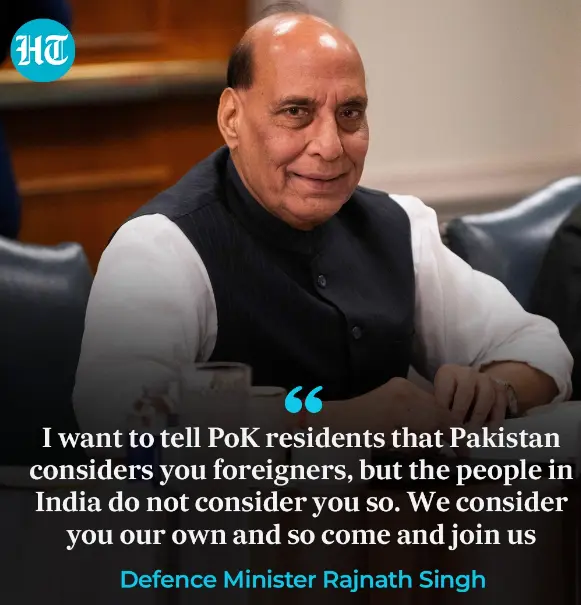Defence Minister Rajnath Singh emphasized that, unlike Pakistan, India regards the people of Pakistan-occupied Kashmir (PoK) as their own. He urged PoK residents to join India, highlighting that they are treated as “foreigners” in Pakistan, while India sees them as part of its community.

Rajnath Singh’s Call to PoK Residents: A Vision of Unity
During a recent rally in Jammu and Kashmir’s Ramban constituency, Defence Minister Rajnath Singh made a powerful appeal to the residents of Pakistan-occupied Kashmir (PoK), urging them to join India. Singh emphasized that unlike Pakistan, which treats the people of PoK as “foreigners,” India considers them its own. His remarks were part of a broader political campaign as India prepares for elections in the region.
Singh’s speech drew attention to the developmental strides made in Jammu and Kashmir since the abrogation of Article 370 in August 2019. He highlighted how these changes have improved security and provided more opportunities for youth, who now choose education and employment over militancy. This transformation, Singh argued, is a testament to the Indian government’s commitment to the region’s prosperity, creating a stark contrast with the conditions in PoK, where residents face political and social marginalization under Pakistan’s rule.
Rajnath singh also linked this message to a recent affidavit by a Pakistani lawyer that highlighted the mistreatment of PoK citizens, further strengthening his argument that residents of the region would be better off under Indian governance. Singh suggested that, given the evident progress in Jammu and Kashmir, the people of PoK would naturally desire to become part of India.
His statements serve as a continuation of India’s longstanding position on PoK, with Rajnath Singh reiterating that the region rightfully belongs to India. This narrative is crucial for the ruling BJP, which has consistently advocated for integrating PoK and ensuring Jammu and Kashmir’s complete unity under Indian administration.
Singh also took the opportunity to criticize opposition parties like the Congress and the National Conference, who have called for restoring Article 370, dismissing such promises as impossible under the BJP’s rule. He further urged voters to support the BJP, promising that continued development in Jammu and Kashmir would set an example for PoK residents to follow.
In conclusion, Rajnath Singh’s call to PoK residents is both a message of unity and a reflection of India’s vision for a prosperous, peaceful Jammu and Kashmir, underlining the region’s strategic and emotional significance to the nation.
Tap here to read more about: Prince Hisahito Becomes First Male Heir in Japan’s Royal Family to Reach Adulthood in Four Decades, Reviving Hope for the Imperial Line
Polling in Jammu and Kashmir: Three Phases
The upcoming elections in Jammu and Kashmir will be held across three phases on September 18, September 25, and October 1, with the vote counting scheduled for October 8.
Breakdown of Assembly Constituencies
Jammu and Kashmir has 90 assembly constituencies, divided for representation:
- 7 seats are reserved for SCs (Scheduled Castes): These are reserved for candidates from marginalized groups classified as SCs, aimed at ensuring political representation for historically disadvantaged communities.
- 9 seats are reserved for STs (Scheduled Tribes): Similarly, these seats are reserved for ST candidates to protect the interests of tribal populations and integrate them into the political process.
The reservations are designed to provide a voice for underrepresented communities, ensuring their participation in legislative decision-making and contributing to a more inclusive democracy. The phased polling ensures the smooth conduct of elections, especially in sensitive areas, maintaining security and voter engagement throughout the region.